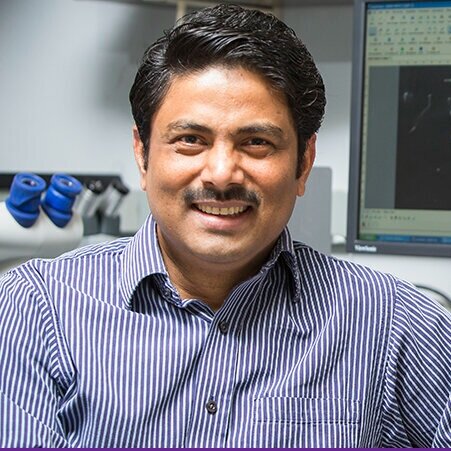2027 MAMPM SCIENTIFIC PROGRAM COMMITTEE
Kimberly Davis, PhD, MSc
MAMPM 2027 Meeting Chair
Johns Hopkins Bloomberg School of Public Health
Dr. Kim Davis is an Associate Professor in the Department of Molecular Microbiology and Immunology at Johns Hopkins Bloomberg School of Public Health. Her lab utilizes both Yersinia and Staphylococcus aureus infection models to understand how bacteria adapt to antibiotic treatments, the role of immune cells in promoting clearance of bacterial infection, and how additional antibiotics or modulation of the host immune response can improve treatment efficacy.
Born and raised outside Cincinnati, Ohio, Davis earned a PhD in Cell and Molecular Biology from the University of Pennsylvania School of Medicine in the lab of Dr. Jeffrey Weiser. She conducted her postdoctoral study in the lab of Dr. Ralph Isberg at Tufts University School of Medicine, where she first began studying Yersinia and heterogeneity within bacterial populations.
Hervé Agaisse, PhD
University of Virginia School of Medicine
Dr. Hervé Agaisse received his PhD at the Pasteur Institute in Paris working on the regulation of toxin gene expression in the entomopathogen Bacillus thuriengiensis. He conducted his post-doctoral training at the Harvard Medical School studying the innate immune response to bacterial infection in Drosophila melonogaster and developed high-throughput RNAi-based genomic approaches for identifying host genes supporting intracellular infection. He started his laboratory in 2005 at Yale University where his group applied the RNAi methodology combined with high-throughput microscopy to systematically identify host genes supporting the dissemination of intracellular pathogens, including Listeria monocytogenes, Shigella flexneri and vaccinia virus. Hervé joined UVa in 2015 where he is currently conducting a research program centered on the molecular and cellular mechanisms supporting Shigella flexneri infection in tissue culture systems and newly developed small-animal models of Bacillary dysentery.
Shaun Brinsmade, PhD
Georgetown University
Dr. Shaun Brinsmade is an Associate Professor with the Department of Biology with a joint appointment within the Department of Microbiology and Immunology. Dr. Brinsmade received a BS from the University of Connecticut-Storrs in 2001, followed by a PhD from the University of Wisconsin-Madison in 2007. Research in the Brinsmade Laboratory seeks to understand how bacteria control pathogenesis using nutritional and host cues during infection. Currently they are focused on the Gram-positive, opportunistic pathogen Staphylococcus aureus.
Brian Conlon, PhD
University of North Carolina at Chapel Hill School of Medicine
Dr. Brian Conlon is a native of Co. Galway in Ireland. He attended the National University of Galway, Ireland as an undergraduate and was awarded a PhD from University College Dublin in 2009 where he worked in Dr. Jim O'Gara's lab examining biofilm formation in Staphylococci. In 2010, he began working in Dr. Kim Lewis laboratory at Northeastern University in Boston, as a postdoc and then as a senior research scientist. He began his independent research career at University of North Carolina at Chapel Hill in August 2016.
Erin Garcia, PhD
University of Kentucky College of Medicine
Dr. Erin Garcia is an Assistant Professor in the Department of Microbiology, Immunology, and Molecular Genetics at the University of Kentucky College of Medicine. Dr. Garcia received her B.S. in Biology from Central Michigan University, followed by a PhD in Microbiology and Immunology at the University of Michigan and Postdoctoral training at the University of North Carolina. Dr. Garcia’s lab focuses on understanding the molecular mechanisms that govern antagonistic and cooperative interactions between Burkholderia species in the context of infectious disease.
Asiya Gusa, PhD
Duke University School of Medicine
Dr. Asiya Gusa earned her PhD in Microbiology and Molecular Genetics from Emory University studying bacterial pathogenesis with Dr. June R. Scott. She transitioned to studying genome instability in yeast as a postdoc with Dr. Sue Jinks-Robertson at Duke University. At Duke, Dr. Gusa received training through the Tri-Institutional Molecular Mycology and Pathogenesis Training Program and received a prestigious K99/R00 fellowship funded by the NIH/NIAID to aid in her transition to faculty. Dr. Gusa’s research focuses on stress adaptation in Cryptococcus, a critical human fungal pathogen that causes life-threatening disease when it infects the lungs and brain. She began her appointment as Assistant Professor in the Duke School of Medicine’s Molecular Genetics and Microbiology department in May of 2023.
Erin Harberts, PhD
Towson University
Dr. Erin Harberts is an Assistant Professor in the Department of Biological Sciences at Towson University. Dr. Harberts received a BA in Molecular Biology from Colgate University, followed by a PhD in Microbiology and Immunology from the University of Maryland School of Medicine. Her areas of expertise include innate immunity, cell signaling, and host-pathogen interactions.
MD A. Motaleb, PhD
East Carolina University Brody School of Medicine
Dr. MD Motaleb is an Associate Professor in the Department of Microbiology and Immunology at the East Carolina University Brody School of Medicine. Dr. Motaleb received his BS and MS from the University of Dhaka in Bangladesh, and his PhD from Osaka University in Japan. His research focuses on Borrelia burgdorferi as well as other pathogenic spirochetes.
M. Ammar Zafar, PhD
Wake Forest University School of Medicine
Dr. Ammar Zafar is an Assistant Professor of Microbiology and Immunology at the Wake Forest University School of Medicine. Dr. Zafar received his PhD from the University of Maryland - Baltimore in 2009. His research interests include bacterial infections, enterobacteriaceae, bacterial drug resistance, host-pathogen interactions, and Streptococcus Pneumoniae.









